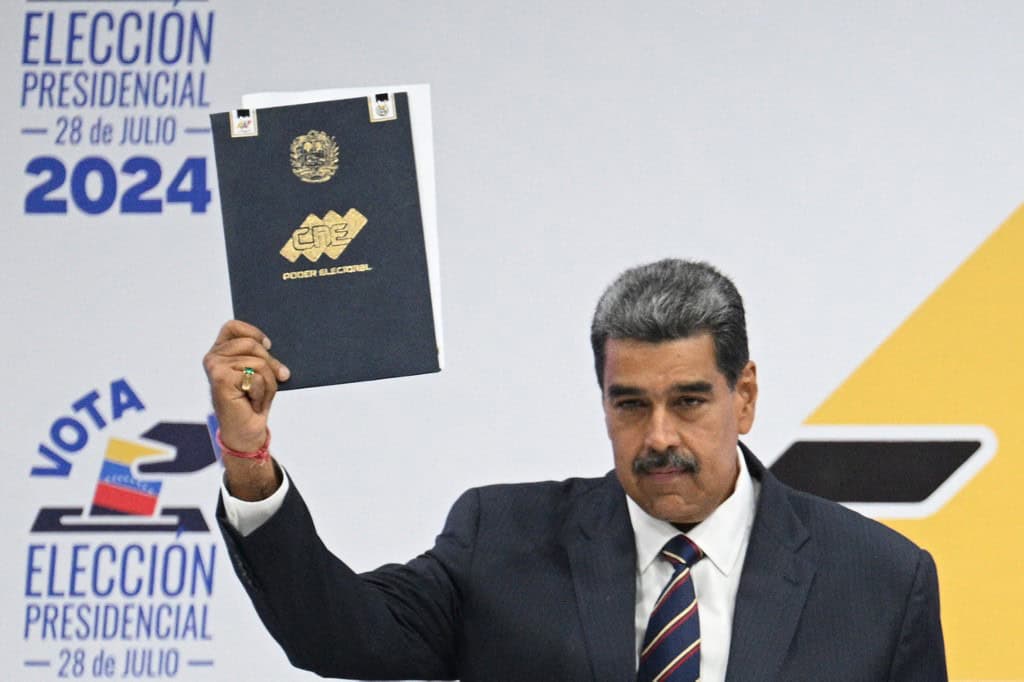“Unheard of,” “unjustified,” “typical of dictatorial regimes”: The decision by Nicolás Maduro’s government to demand the withdrawal of diplomatic personnel from Argentina, Chile, Costa Rica, Panama, Peru, the Dominican Republic, and Uruguay from Venezuela, and to order the withdrawal of its own from these countries, has generated diverse reactions.
These seven countries, along with Ecuador and Paraguay, had requested on Monday a “complete review of the results” of the presidential elections held on Sunday in Venezuela, where the electoral authority proclaimed Maduro re-elected with 51% of the votes over Edmundo González Urrutia’s 44%, representing opposition leader María Corina Machado.
Here are the responses from the governments of these seven countries to Caracas’ announcement of withdrawing diplomatic personnel citing “interfering pronouncements”:
Argentina
“Argentina has not broken ties with Venezuela. If they have, they have not communicated it to us yet,” said Diana Mondino, the foreign minister under President Javier Milei, to the LN+ channel on Monday.
The Argentine government also denounced on Tuesday the “harassment” of its embassy in Caracas, where six of Machado’s associates have been asylum-seekers for weeks.
In a message on X, the foreign ministry denounced that the “Maduro regime” had “cut off the power supply” to the embassy and warned “against any deliberate action that endangers the safety of Argentine diplomatic personnel and Venezuelan citizens under protection.”
Mondino stated on Monday that if Argentine diplomats had to leave the embassy, the Venezuelan government “has the obligation” to allow the refugees to leave with them.
“This is really unheard of,” she said.
Chile
“I have no recollection of such a measure, and what it reveals is the isolation of the Venezuelan government,” said the head of diplomacy under Gabriel Boric’s government, Alberto Van Klaveren, in an interview with CNN Chile.
“It’s only typical of dictatorial regimes,” he noted.
Meanwhile, Interior Minister Carolina Tohá, who serves as acting vice president while Boric is on a tour in the United Arab Emirates, said Chile’s efforts would focus on “ensuring that the elections held in Venezuela a few hours ago have a transparent and validated outcome, respecting the will of the Venezuelan people.”
Costa Rica
A source from the Costa Rican foreign ministry said that Maduro’s measure has no practical effect for the Central American country.
Costa Rica suspended diplomatic relations with Maduro’s government in 2020, withdrawing a Costa Rican diplomat and closing the embassy and consulate effective October 1 of that year.
In 2023, consular relations, not diplomatic, were resumed. However, there is currently no Costa Rican consular staff in Venezuela. Costa Rica provides these services from its missions in Panama, Colombia, and the Dominican Republic.
In Costa Rica, two consular officials are working in a building in San José with a sign that reads “Embassy of Venezuela,” according to the same source.
Panama
Before Venezuela’s decision to withdraw diplomats from seven Latin American countries, Panamanian President José Raúl Mulino had announced the withdrawal of his personnel and put relations with Caracas “on hold.”
Mulino said this would be the case “until a complete review of the records and the voting scrutiny system is conducted to ascertain the genuine popular will.”
Both countries do not have ambassadors, so bilateral relations are maintained with charge d’affaires.
Peru
The Peruvian government, which on Sunday had recalled its ambassador in Venezuela for consultations, ordered Venezuelan diplomats to leave the Andean country “within 72 hours” due to “the grave and arbitrary decisions made today by the Venezuelan regime,” according to a statement.
Uruguay
Uruguayan President Luis Lacalle Pou’s government regretted Venezuela’s measure, calling it “unjustified and disproportionate.”
“It responds abruptly to the legitimate concern raised by our country and the international community regarding irregularities and the lack of transparency observed in the electoral process,” said a statement on Tuesday.
“The decision also leaves thousands of Venezuelans who have had to leave their country and found permanent residence in Uruguay in a vulnerable position and cuts off their connection with their homeland,” it added.
Dominican Republic
Dominican President Luis Abinader expressed his “deep concern about the electoral process in Venezuela, as transparency must be the foundation of its legitimacy.”
The Caribbean country has not yet commented on Maduro’s announcement of withdrawing diplomatic personnel.






